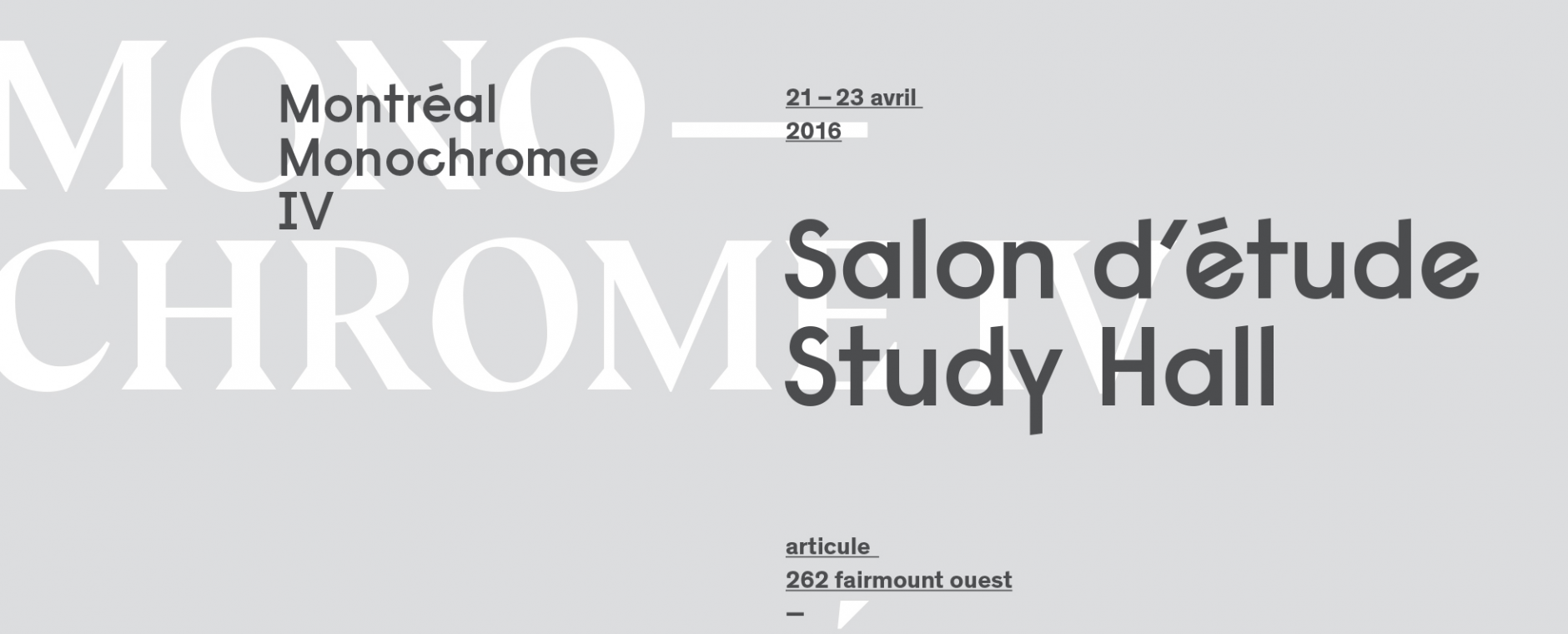Program #MMIV - Day 1
Schedule
11:00 AM Coffee & Opening Remarks
Fabulous Committee
11:30 AM Prep Test
Eunice Bélidor
02:00 PM owawêsîhcikêwak miyowawaynamowin: Resurgent Arts Practices and "Decolonial Love"
Lindsay Nixon
04:30 PM Humanizing the Enslaved: Re-reading Fugitive Slave Advertisements as Evidence of Resistance
Charmaine Nelson
06:30 PM Playing with Food: The Art of Mindful Eating*
Priya Jain
Prep Test
Eunice Bélidor
Montréal Monochrome is an annual event that aims to address the underrepresentation of indigenous and racialized people in the Montreal's visual arts milieu. Every year, we attempt to discover and put forth the issues that come out of the conference. How can we initiate concrete discussions on the topic addressed? With this workshop, I attempt to demonstrate that one of the best ways to find the best solutions and the best answers is to ask the right questions. This 30-45 minute workshop will be about creating a list of relevant questions for Montréal Monochrome IV: STUDY HALL.
Eunice Bélidor is an emerging curator, writer and researcher from Montreal. Her research interests include Haitian contemporary art, feminism, performance art and "post-black" aesthetics. She completed an MA in Art History and Curatorial Studies at York University (Toronto). Her writings have been published in the Journal of Curatorial Studies, Invitation (galerie Art Mûr), En Circulation and Espace Art Actuel. She recently started #CuratorialTips, a research tool for emerging curators. She is the current Programming Coordinator at articule (Montreal).
owawêsîhcikêwak miyowawaynamowin: Resurgent Arts Practices and "Decolonial Love"
Lindsay Nixon
Indigenous peoples have always imagined ourselves into resurgent futurities through our arts practices. Our songs, stories, and visual cultures are sacred links to creation and our kinships (human or otherwise) within that practice. In what ways can settler-dominated arts communities harbor contextual resurgence at a relational level? How can we ensure to always center Indigenous peoples within this project, leading us into possible futures as cultural workers? This workshop will focus on the ways in which colonial relationships affect resurgent arts practices, and on how to create space for Indigenous visual cultures within the arts community, considering its inherent complicity in settler-colonialism, both historically and in this moment.
Lindsay Nixon – an anishinaabekwe / nêhiyaw-iskwêw from the Tootinaowaziibeeng Nation – is a writer, curator, community organizer, and researcher currently residing in Tio’tia:ke. Nixon is the co-founder of the Indigenous Women and Two-Spirit Harm Reduction Coalition and the Indigenous Arts Council, as well as an editor of a forthcoming Indigenous feminist periodical published under the latter.
Humanizing the Enslaved: Re-reading Fugitive Slave Advertisements as Evidence of Resistance
Charmaine Nelson
Although it would appear to be a straightforward text – one in which a slave owner described an enslaved person in the hopes of facilitating their recapture – the fugitive advertisement was steeped in paradox and irony. This study hall will begin with a background discussion on Transatlantic Slavery in order to facilitate a group analysis of fugitive slave advertisements for evidence of the cultural and social resistance of the enslaved. The objective of this undertaking is to understand how the enslaved preserved their individuality and collective cultural practices, in spite of the pervasive surveillance and abuse of slave owners.
Charmaine Nelson is an Associate Professor of Art History at McGill University. Her teaching and research is in the areas of Race and Representation, Black Diaspora Studies, and the Visual Culture of Slavery. She has published five books including The Color of Stone: Sculpting the Black Female Subject in Nineteenth-Century America (2007) and Representing the Black Female Subject in Western Art (2010). Her sixth book, Slavery, Geography, and Empire in Nineteenth-Century Marine Landscapes of Montreal and Jamaica, will be published with Ashgate, UK in 2016. http://blackcanadianstudies.com/
Playing with Food: The Art of Mindful Eating (pay-what-you-can activity)
Priya Jain
In Playing with Food, guests are encouraged to participate in an interactive workshop session that will foster a mindful eating experience and a food-inspired creative therapy process. The event is a tangent from ACHAAR*, an on-going conversation series about cultural confrontations through food, and the role of food as a catalyst for resolving and triggering identity crises. Dinner will be accompanied by facilitated discussions, mindful activities, and art installations reflecting on personal attachments to various foods. *The ACHAAR series is an open collaboration between Aditi Ohri and Priya Jain, documenting and celebrating the function of food in diaspora.
Priya Jain is an artist/yogi interested in the process of artistic practices and their potential as forms of creative therapy. Her own practice experiments with collage making, collective mandala colouring, interventional rituals, and ephemeral media such as wax and fire to create spaces of meditation for the viewer. She is currently pursuing a BFA in Art History at Concordia University.
MMIV: STUDY HALL - Day 2
Program #MMIV - Day 2
Schedule
MMIV: STUDY HALL - Day 3
Program #MMIV - Day 3
Schedule
11:00 AM Celebrating our Poetics—A Study
Ronald Rose-Antoinette
